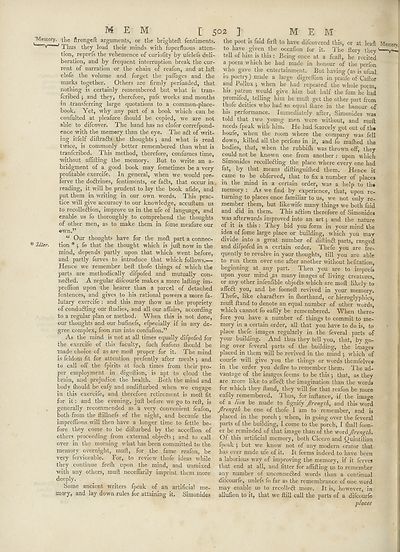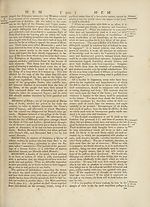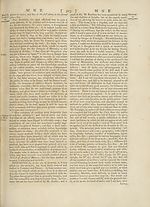Encyclopaedia Britannica, or, a Dictionary of arts, sciences, and miscellaneous literature : enlarged and improved. Illustrated with nearly six hundred engravings > Volume 13, MAT-MIC
(544) Page 502
Download files
Complete book:
Individual page:
Thumbnail gallery: Grid view | List view

MEM [ 502 ] MEM
' Memory, tlie ftrongeft arguments, or the brigliteft fentiments.
v -I hus they load their minds with fuperffuous atten¬
tion, reprefs the vehemence of curiofity by ufelefs deli¬
beration, and by frequent interruption break the cur¬
rent of narration or the chain of reafon, and at laft
clofe the volume and forget the paffag'es and the
marks together. Others are firmly perfuaded, that
nothing is certainly remembered but what is tran-
feribed ; and they, therefore, pafs weeks and months
in transferring large quotations to a common-place-
book. Yet, why any part of a book which can be
confulted at pleafure fliould be copied, we are not
able to difcover. The hand has no clofer correfpond-
ence with the memory than the eye. The aft of writ¬
ing itfelf diftrafts the thoughts; and what is read
twice, is commonly better remembered than what is
tranfcribed. This method, therefore, confumes time,
without afliiling the memory. But to write an a-
bridgment of a good book may fometimes be a very
profitable exercife. In general, when we wrould pre-
ierve the doftrines, fentiments, or fafts, that occur in
reading, it will be prudent to lay the book afide, and
put them in writing in our own words. This prac¬
tice will give accuracy to our knowledge, accuftom us
to recolleftion, improve us in the ufe of language, and
enable us fo thoroughly to comprehend the thoughts
of other men, as to make them in fome meafure our
©wn.”
u Our thoughts have for the moft part a connec-
& Idler. tion * ; fo that the thought which is juft now in the
mind, depends partly upon that which went before,
and partly ferves to introduce that which follows.—
Hence we remember beft thofe things of which the
parts are methodically difpofed and mutually con-
nefted. A regular difcourfe makes a more lafting im-
preffion upon the hearer than a parcel of detached
fentences, and gives to his rational powers a more fa-
lutary exercife : and this may ftiow us the propriety
of conduft'ing our ftudies, and all our affairs, according
to a regular plan or method. When this is not done,
our thoughts and our bufinefs, efpecially if in any de¬
gree complex, foon run into confufion.”
As the mind is not at all times equally difpofed for
the exercife of this faculty, fuch feafons fliould be
Inade choice of as are moft proper for it. The mind
is feldom fit for attention prefently after meals and
to call off the fpirits at fuch times from their pro¬
per employment in digeftion, is apt to cloud the
brain, and prejudice the health. Both the mind and
body ftiould be eafy and undifturbed when we engage
in this exercifej and therefore retirement is moft fit
for it : and the evening, juft before we go to reft, is
generally recommended as a very Convenient feafon,
both from the ftillnefs of the night, and becaufe the
impreflions will then have a longer time to fettle be¬
fore they come to be difturbed by the acceffion of
others proceeding from external objefts and to call
over in the morning what has been committed to the
memory overnight, muft, for the fame reafon, be
very ferviceable. For, to review thofe ideas while
they continue frefii upon the mind, and unmixed
with any others, muft neceffarily imprint them more
deeply.
Some ancient writers fpeak of an artificial me¬
mory, and lay down rules for attaining iL Simonides
the poet is faid firft to have difcovered this, or at leafi Memory
to have given the occafion for it. The ftory they"V—
tell of him is this : Being once at a feaft, he recited
a poem which he had made in honour of the perfon
who gave the entertainment. But having (as is ufual
in poetry) made a large digreflion in praife of Caftor
and Pollux j when he had repeated the whole poem,
his patron would give him but half the fum he had
promifed,. telling him he muft get the other part from
thofe deities who had an equal fhare in the honour of
his performance. Immediately after, Simonides was
told that two young men were without, and muft
needs Ipeak with him. He had fcarcely got out of tha
houie, when the room where the company was fell
down, killed all the perfons in it, and fo mafhed the
bodies, that, when the rubbifh was thrown oft', they
could not be known one from another : upon which
Simonides recollefting the place where every one had
fat, by that means diftinguiftied them. Hence it
came to be obferved, that to fix a number of places
in the mind in a certain order, was a help to th®
memory : As we find by experience, that, upon re¬
turning to places once familiar to us, we not only re¬
member them, but likewife many things we both faid
and did in them. This aftion therefore of Simonides
was afterwards improved into an art; and the nature
of it is this : 1 hey bid you form in your mind the
idea of fome large place or building, which you may
divide into a great number of diftinft parts, ranged
and difpofed in a certain order. Thefe you are fre¬
quently to revolve in your thoughts, till you are able
to run. them over one after another without hefitation,
beginning at. any part. Then you are to imprefs
upon your mind as many images of living creatures,
or any other infenfible objefts which are moft likely to
affeft you, and be fooneft revived in your memory.
Thefe, like charafters in ftiorthand, or hieroglyphics,
muft ftand to denote an equal number of other words,
which cannot fo eafily be remembered. When there¬
fore you have a number of things to commit to me¬
mory in a certain order, all that you have to do is, to
place thefe images regularly in the feveral parts of
your building. And thus they tell you, that, by go¬
ing over feveral parts of the building, the images
placed in them will be revived in the mind 5 which of
courfe will give you the things or words themfelve#'
in the order you defire to remember them. The ad¬
vantage of the images feems to be this 5 that, as they
are more like to affeft the imagination than the w'ords
for which they ftand, they will for that reafon be more
eafily remembered. Thus, for inftance, if the image
of a lion be made to fignify Jlrength, and this word
Jlrength be one of thofe I am to remember, and is
placed in the porch 5 when, in going over the feveral
parts of the building, I come to the porch, I fliall foon-
er be reminded of that image than of the w'ord Jlrength.
Of this artificial memory, both Cicero and Quintilian
fpeak } but w’e know not of any modern orator that
has ever made ufe of it. It feems indeed to have been
a laborious way of improving the memory, if it ferves
that end at all, and fitter for affifting us to remember
any number of unconnefted words than a continual
difcourfe, unlefs fo far as the remembrance of one word
may enable us to recolleft more. It is, however, in
allufion to it, that we ftill call the parts of a difcourfe
places
' Memory, tlie ftrongeft arguments, or the brigliteft fentiments.
v -I hus they load their minds with fuperffuous atten¬
tion, reprefs the vehemence of curiofity by ufelefs deli¬
beration, and by frequent interruption break the cur¬
rent of narration or the chain of reafon, and at laft
clofe the volume and forget the paffag'es and the
marks together. Others are firmly perfuaded, that
nothing is certainly remembered but what is tran-
feribed ; and they, therefore, pafs weeks and months
in transferring large quotations to a common-place-
book. Yet, why any part of a book which can be
confulted at pleafure fliould be copied, we are not
able to difcover. The hand has no clofer correfpond-
ence with the memory than the eye. The aft of writ¬
ing itfelf diftrafts the thoughts; and what is read
twice, is commonly better remembered than what is
tranfcribed. This method, therefore, confumes time,
without afliiling the memory. But to write an a-
bridgment of a good book may fometimes be a very
profitable exercife. In general, when we wrould pre-
ierve the doftrines, fentiments, or fafts, that occur in
reading, it will be prudent to lay the book afide, and
put them in writing in our own words. This prac¬
tice will give accuracy to our knowledge, accuftom us
to recolleftion, improve us in the ufe of language, and
enable us fo thoroughly to comprehend the thoughts
of other men, as to make them in fome meafure our
©wn.”
u Our thoughts have for the moft part a connec-
& Idler. tion * ; fo that the thought which is juft now in the
mind, depends partly upon that which went before,
and partly ferves to introduce that which follows.—
Hence we remember beft thofe things of which the
parts are methodically difpofed and mutually con-
nefted. A regular difcourfe makes a more lafting im-
preffion upon the hearer than a parcel of detached
fentences, and gives to his rational powers a more fa-
lutary exercife : and this may ftiow us the propriety
of conduft'ing our ftudies, and all our affairs, according
to a regular plan or method. When this is not done,
our thoughts and our bufinefs, efpecially if in any de¬
gree complex, foon run into confufion.”
As the mind is not at all times equally difpofed for
the exercife of this faculty, fuch feafons fliould be
Inade choice of as are moft proper for it. The mind
is feldom fit for attention prefently after meals and
to call off the fpirits at fuch times from their pro¬
per employment in digeftion, is apt to cloud the
brain, and prejudice the health. Both the mind and
body ftiould be eafy and undifturbed when we engage
in this exercifej and therefore retirement is moft fit
for it : and the evening, juft before we go to reft, is
generally recommended as a very Convenient feafon,
both from the ftillnefs of the night, and becaufe the
impreflions will then have a longer time to fettle be¬
fore they come to be difturbed by the acceffion of
others proceeding from external objefts and to call
over in the morning what has been committed to the
memory overnight, muft, for the fame reafon, be
very ferviceable. For, to review thofe ideas while
they continue frefii upon the mind, and unmixed
with any others, muft neceffarily imprint them more
deeply.
Some ancient writers fpeak of an artificial me¬
mory, and lay down rules for attaining iL Simonides
the poet is faid firft to have difcovered this, or at leafi Memory
to have given the occafion for it. The ftory they"V—
tell of him is this : Being once at a feaft, he recited
a poem which he had made in honour of the perfon
who gave the entertainment. But having (as is ufual
in poetry) made a large digreflion in praife of Caftor
and Pollux j when he had repeated the whole poem,
his patron would give him but half the fum he had
promifed,. telling him he muft get the other part from
thofe deities who had an equal fhare in the honour of
his performance. Immediately after, Simonides was
told that two young men were without, and muft
needs Ipeak with him. He had fcarcely got out of tha
houie, when the room where the company was fell
down, killed all the perfons in it, and fo mafhed the
bodies, that, when the rubbifh was thrown oft', they
could not be known one from another : upon which
Simonides recollefting the place where every one had
fat, by that means diftinguiftied them. Hence it
came to be obferved, that to fix a number of places
in the mind in a certain order, was a help to th®
memory : As we find by experience, that, upon re¬
turning to places once familiar to us, we not only re¬
member them, but likewife many things we both faid
and did in them. This aftion therefore of Simonides
was afterwards improved into an art; and the nature
of it is this : 1 hey bid you form in your mind the
idea of fome large place or building, which you may
divide into a great number of diftinft parts, ranged
and difpofed in a certain order. Thefe you are fre¬
quently to revolve in your thoughts, till you are able
to run. them over one after another without hefitation,
beginning at. any part. Then you are to imprefs
upon your mind as many images of living creatures,
or any other infenfible objefts which are moft likely to
affeft you, and be fooneft revived in your memory.
Thefe, like charafters in ftiorthand, or hieroglyphics,
muft ftand to denote an equal number of other words,
which cannot fo eafily be remembered. When there¬
fore you have a number of things to commit to me¬
mory in a certain order, all that you have to do is, to
place thefe images regularly in the feveral parts of
your building. And thus they tell you, that, by go¬
ing over feveral parts of the building, the images
placed in them will be revived in the mind 5 which of
courfe will give you the things or words themfelve#'
in the order you defire to remember them. The ad¬
vantage of the images feems to be this 5 that, as they
are more like to affeft the imagination than the w'ords
for which they ftand, they will for that reafon be more
eafily remembered. Thus, for inftance, if the image
of a lion be made to fignify Jlrength, and this word
Jlrength be one of thofe I am to remember, and is
placed in the porch 5 when, in going over the feveral
parts of the building, I come to the porch, I fliall foon-
er be reminded of that image than of the w'ord Jlrength.
Of this artificial memory, both Cicero and Quintilian
fpeak } but w’e know not of any modern orator that
has ever made ufe of it. It feems indeed to have been
a laborious way of improving the memory, if it ferves
that end at all, and fitter for affifting us to remember
any number of unconnefted words than a continual
difcourfe, unlefs fo far as the remembrance of one word
may enable us to recolleft more. It is, however, in
allufion to it, that we ftill call the parts of a difcourfe
places
Set display mode to:
![]() Universal Viewer |
Universal Viewer | ![]() Mirador |
Large image | Transcription
Mirador |
Large image | Transcription
Images and transcriptions on this page, including medium image downloads, may be used under the Creative Commons Attribution 4.0 International Licence unless otherwise stated. ![]()
| Permanent URL | https://digital.nls.uk/192668234 |
|---|
| Attribution and copyright: |
|
|---|
| Description | Ten editions of 'Encyclopaedia Britannica', issued from 1768-1903, in 231 volumes. Originally issued in 100 weekly parts (3 volumes) between 1768 and 1771 by publishers: Colin Macfarquhar and Andrew Bell (Edinburgh); editor: William Smellie: engraver: Andrew Bell. Expanded editions in the 19th century featured more volumes and contributions from leading experts in their fields. Managed and published in Edinburgh up to the 9th edition (25 volumes, from 1875-1889); the 10th edition (1902-1903) re-issued the 9th edition, with 11 supplementary volumes. |
|---|---|
| Additional NLS resources: |
|

